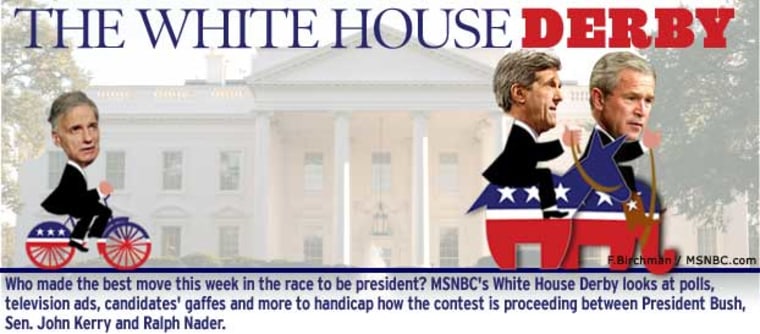President Bush had not seen news this sanguine for his re-election hopes in weeks: jobs and lots of them. On Friday, the Bureau of Labor Statistics reported that nonfarm payroll employment jumped by 308,000 in March, far beyond the consensus expectation of economists.
Democrats naturally were quick to note that 8.4 million Americans were still seeking work in March and that one good month does not a full recovery make. Still, Bush strategists could breathe easier.
Bush had been on the defensive on gasoline prices this week. Many Americans get agitated when they must pay more than $2 for a gallon of gasoline, especially as they plan their summer vacations, and the OPEC cartel had not helped the Bush re-election effort by voting Wednesday to cut crude oil production.
Saudi assurances
But then Saudi ambassador Prince Bandar paid a call on the president Thursday to assure him that the Saudi regime would provide adequate oil supplies and not endanger economic growth — a signal perhaps that that OPEC production cut is a goal that won't be met.
Earlier in the week, it was something of a mystery why Bush's poll numbers were not worse than they were, given the pounding Bush had taken from his former counter-terrorism advisor Richard Clarke.
One answer: Many respondents see Clarke as too political, even with the understanding that almost everyone in Washington in an election year is a political animal, to a greater or lesser degree.
Some evidence for the “too-partisan Clarke” theory: In a Los Angeles Times poll released Thursday, nearly 60 percent of respondents agreed that Clarke's new book was "politically motivated" and designed to influence the election.
Also, Clarke himself seemed to recognize that he is viewed as a partisan, complaining to an anti-Bush group, MoveOn.org, that it ought not to be using his voice from a “60 Minutes” interview blistering Bush for allegedly not taking steps to deter the Sept. 11 catastrophe.
MoveOn.org leaders replied that they’d continue to use Clark as their anti-Bush cheerleader, whether he liked it or not.
(That Move On.org ad, with its sinister black-and-white imagery, is the most visually evocative and memorable anti-Bush ad that any of the well-funded anti-Bush groups have broadcast so far.)
A tall order for Kerry
Asked whether Bush's policies on terrorism and national security have made the country more secure, 59 percent of respondents in the Los Angeles Times poll said more secure, 18 percent said less secure, while one-fifth said they made no difference. This suggests Kerry has a tall order to take the national security issue away from Bush.
Bush and Kerry were statistically tied in the “if the election were being held today” question in the L.A. Times poll, with Kerry drawing 47 to Bush 44, and Ralph Nader winning 4 percent.
Earlier this week, a Pew Research Center survey found that “a week’s worth of criticism of his pre-Sept. 11 record on terrorism has had little impact on President Bush’s support among voters.”
Pew found Bush running even with Kerry in a head-to-head match-up, after trailing Kerry by 52 percent to 43 percent a few weeks ago.
